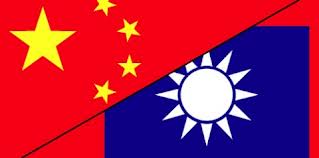At CNN, Ben Westcott and Yong Xiong report that Beijing has suspended a program allowing individual Chinese tourists to visit Taiwan amid rising tensions between Taipei and Beijing.
In a statement, China’s Ministry of Culture and Tourism said the travel ban would come into force on August 1, effectively banning all individual leisure travel from mainland China to Taiwan.
Business travelers and tour groups will still be able to visit Taiwan from mainland China.
The individual visit program was piloted in June 2011 in three cities — Beijing, Shanghai and Xiamen — before being expanded to residents of 47 cities to encourage closer ties between Taiwan and the mainland.
At The Washington Post, Anna Fifield surveys the reactions of regional experts, as well as Chinese travel agents and would-be potential tourists to Taiwan:
Travel agents were caught by surprise by the move. “Everyone in the tourism industry is expecting some reactions from the mainland prior to major political events, but nobody expected it to come so soon, as the elections are still months away,” said Ting Lai, vice chairman of the Travel Agent Association in Taiwan.
He estimated that the change would keep at least half a million mainlanders from traveling to the island before the Jan. 11 election. “But there is no way to know exactly how many individual travelers will be canceling their Taiwan trips. We can just wait and see,” he said.
[…] “The moment I saw the news today, I knew that I should go out and get an exit permit, just in case,” said Liu Ming, a 38-year-old freelance photographer based in Chengdu [who also noted he had no immediate plans to travel there, but wanted papers in case “the opportunity arises”].
[…] The travel restrictions are an “overt public message” to Taiwan from Beijing, said Margaret Lewis, an expert on Taiwan at Seton Hall University.
“There is no doubt that this is an escalation,” she said. “The question is how far it will escalate and what could defuse it.” [Source]
At the Nikkei Asian Review, Nikki Sun and Lauly Li relay official statements from Taiwan on the abrupt termination of the program:
Taiwan’s Presidential Office said in a statement: “We are sorry to see China unilaterally placing restrictions [on issuing visas].”
The statement criticized China for interfering in the daily life and plans of ordinary people. It said that such an action does not help “increase understanding of two sides of the strait.”
Kaohsiung City Government issued a statement on behalf of Mayor Han Kuo-yu, Kuomintang’s presidential candidate, stating he was “highly concerned” about China’s announcement.
“It will dampen Taiwan’s tourism industry, which is already facing challenges,” the statement said. “It proves that the peaceful stability of cross-strait relationship is important to Taiwan.” It added: “Taiwanese people are not equal to the [pro-independent] Democratic Progressive Party.” [Source]
Cross-strait relations–strained since the 2016 election of Tsai Ing-wen as President of Taiwan–have become increasingly troubled following the U.S.’ recent appproval of a $2.2 billion dollar arms sale to Taipei, official Taiwanese support for the ongoing pro-democracy protests in Hong Kong, and President Tsai’s recent trip to New York.
Meanwhile, China labeled Taiwan “separatism” a chief security risk that may require military force in a defense white paper released last week. The Associated Press reported today on the conclusion of multi-day live-fire drills launched by Taiwan to coincide with Chinese drills that the Global Times reported aimed to “serve as a warning to Taiwan secessionists.”
With Tsai and her Democratic-Progressive Party (DPP) gearing up for an election in January 2020, Voice of America’s Ralph Jennings reports on suspicions of attempts by Beijing to influence the results:
Authorities in Beijing have influenced Taiwan’s “grassroots” by enticing tourists, buying advertisements and using the “mafia,” the island government’s Mainland Affairs Council told VOA in a statement Monday. Some scholars also say the Chinese government pays some Taiwanese media outlets a fee for posting pro-Beijing reports.
“The Chinese Communists are actively intervening in the 2020 elections and that’s to violate Taiwan’s sovereignty, as well as destroy our democratic system,” the statement reads. Council spokesman Chiu Chui-cheng told VOA he wants China to stop.
Most Taiwanese oppose unification with China, a government opinion survey showed in January. Many also hope for stronger business relations with China, however, given its economic clout.
[…] Tsai’s election opponent, Han Kuo-yu, supports opening talks with China to bolster economic and investment ties. Beijing’s influence could bolster support for Han before the vote in January, analysts in Taiwan say.
[…] “The outcome is clear, the outcome is impact on the January presidential and legislative elections, so I think if there was no Chinese influence, Han Kuo-yu wouldn’t be polling so high in surveys,” said Michael Tsai, chairman of the Institute for Taiwan Defense and Strategic Studies in Taiwan. [Source]








